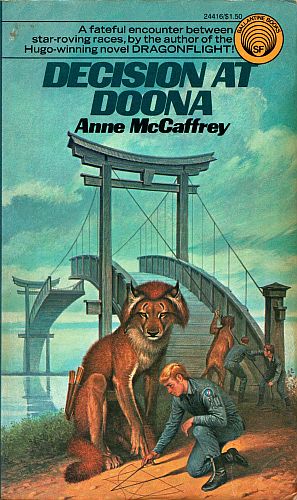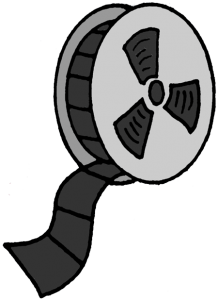
|
| Cover artist unknown |

Film This!

|
| Cover artist unknown |

| DECISION AT DOONA Anne McCaffrey New York: Ballantine Books, April 1975 |
Rating: 5.0 High |
|||
| ISBN-13 978-0-345-24416-1 | ||||
| ISBN-10 0-345-24416-8 | 245pp. | SC | $1.50 | |
The colonists had survived a long winter on Doona, having established a common building, housing for each family, and various utilitarian structures. Now it was spring, and fields sown with native grain were sprouting, promising food for the draft animals to be imported from Earth. More than utility was involved here, for those species were going extinct on the overcrowded home planet. Life for humans was nearly intolerable there, with its extreme regimentation that forbid even a raised voice or a rapid step. Thus the men on Doona were delighted to have earned the freedom they found there, and soon their wives and children would be arriving to make their joy complete.
Then Sam Gaynor and Ken Reeve, exploring across the river, found a village of non-humans. They remained unobserved, and after taking photographs returned on the run to alert the others. The presence of intelligent native species was a great mystery, for the planet had been surveyed from space by robots and then at ground level by crews from SpaceDep — and they themselves had visited the area last fall and found it empty. But there was the village of catlike creatures who walked on two legs and wore knives on their belts — which, according to the Non-Cohabitation Directive which they had sworn to uphold, meant the end of their dreams of freedom. They would have to return to the squalor and confinement of Earth.
They dutifully reported the situation with a homing capsule. There was no way to stop the ship carrying their families; that was already in hyperdrive. But the twenty-two men expected it would take them off; and if not, a transport would arrive in another four or five days. Shortly the Astrid landed and disgorged their families, along with horses, cows, and other farm animals and several tons of supplies. But they got a temporary reprieve: Captain Kiachif had a schedule, and he wasn't about to linger around waiting for new orders. He took the Astrid off the next morning, just a few minutes before those orders arrived by capsule.
Meanwhile they got along famously with the natives, who helped them build a bridge across the river and eagerly pitched in to learn about the horses, which they greatly admired. Things were developing well; mutual understanding advanced via the learning of languages, although the pitch-based, r-rolling tongue of the Hrrubans was hard for humans to master. Six-year-old Todd Reeve, who had been a terror on the trip out, was transformed on Doona and became an adept in the language, spending all his free time in the Hrruban village.
Natives and humans were in the middle of building a barn to house the livestock during the next winter when the colony's beacon announced another spaceship on approach — and the Hrrubans abruptly returned to their village. The ship brought Captain Landreau of SpaceDep on a mission to carry out the order to expedite the search for alien landing sites on Doona. He got into an argument with Ken, who insisted the Hrrubans were natives and berated SpaceDep for missing their presence earlier. To resolve the dispute, they hiked across the bridge to the village — and found the site barren of any sign of habitation. It was an abiding mystery, and Landreau took it as proof that the colonists had fabricated the whole thing, even the photographs and language tapes, to trigger their removal because they couldn't take life on Doona. The colonists resisted, militantly, and Landreau's ship departed.
In a short time the Hrruban reappeared, resuming cooperation as if nothing had happened. Then came a ship of CoDep (Colony Department), bearing the supercilious Chaminade. And before it landed the Hrruan were gone again, this time taking Ken's son Todd with them. Shortly thereafter, Landreau returned; he had parked his ship on a nearby moon. Both officials demanded that the colonists leave. Again they resisted, and both ships departed.
But the colonists' troubles were far from over. Another of Doona's surprises, the giant lizards first sighted just before the CoDep ship arrived, were approaching the camp. As measures were started to block their advance, the largest ship yet seen touched down. It was Landreau, now backed up by squads of space marines, asserting that he now had authority over Doona. Ken Reeves went rogue, evading Landreau's troops and delaying the deportation. He circled back to the village and watched from hiding but was spotted by a guard. He escaped to the site of the village and was briefly visited by a Hrruban friend, who gave him information that sent him back to the mess hall. There he found the Hrruban bug that was planted under a table. With this undeniable proof of Hrruban existence in his pocket, he surprised two guards and took their weapons, gaining a bargaining position with Landreau. But by that time three ships were on the ground: Chaminade's, and one from AlRelDep (Alien Relations), the department that really had jurisdiction over the human colony on Doona — represented by Admiral Sumitral, who was well acquainted with traces of Hrruban explorations. But the ultimate authority rested with Hrruba's government, which was wrestling with its own factional conflicts.
The novel is well plotted, with good dialog and decent characterization. The gimmicks are plausible, even the giant lizards (which apparently spend part of their long lives in the deep sea) and the scenes of jeopardy are adroitly done. Anne McCaffrey (1926-2011) was an accomplished equestrian, and she gives the reader ample proof of that here. Adding depth is her notion that both humans and Hrrubans are struggling with declining civilizations and eager to revitalize themselves through pioneering ventures. There is one continuity error: the final negotiations decree that "No Hrruban was to visit Terra in any circumstances; no Terran could go to Hrruba." (page 235) This after the parties had agreed that a small matter-transmission facility would be placed on Terra, overseen at all times by Hrrubans. (page 234) There are two or three minor grammar errors.1 But this is a well-crafted story all around, and very suitable for a film. Full marks.

 To contact Chris Winter, send email to this address.
To contact Chris Winter, send email to this address.